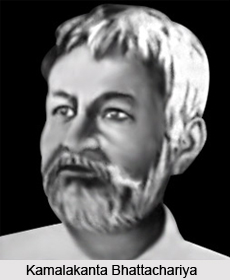 Kamalakanta Bhattacharya (1853-1937 was one of the leading poets of Assam. Romantic Revival was doubtless very wholesome. Its love of beauty developed in the Assamese poets a fuller appreciation of the scenic grandeur of their country. Similarly, its interest in antiquity imbued the Assamese poets with a deeper understanding and a more intense love of the national heritage. A leading poet of this new movement was Kamalakanta Bhattacharya (1858-1936).
Kamalakanta Bhattacharya (1853-1937 was one of the leading poets of Assam. Romantic Revival was doubtless very wholesome. Its love of beauty developed in the Assamese poets a fuller appreciation of the scenic grandeur of their country. Similarly, its interest in antiquity imbued the Assamese poets with a deeper understanding and a more intense love of the national heritage. A leading poet of this new movement was Kamalakanta Bhattacharya (1858-1936).
In the poetry of Kamalakanta Bhattacharya there is the triple strand of the patriot, philosopher and social reformer. For the first time in Assamese Literature, he sounded the clarion call of liberal patriotism. His patriotism, however, consisted not only in rousing a forgetful, sleeping but puissant nation to the glories of their ancient culture, but also in urging it to march with the times and follow the methods of western nations.
He released his first volume of poems Chintanal in 1890 and the last Chintatarangini in 1933. Bhattacharya is of the transition, yet away from it. However it is difficult to categorise into a particular period as he has had an extensive literary life. When the poetic language was a compound of conceits he revolutionized poetic diction. Patriotism was visible in his works. He was also faithful transcribers of social problems. He believed that life and society was based on the principle of solitary search for truth. His works include Rangpur and Sibsagar darshan, Kuwa paharani. The first two possessed a direct style. Kuwa paharani is one of Bhattacharjya`s popular poems. The love of patriotic ideals assumes a universal note in Chintalarangini. Bhattacharjya is poetically in a nationalistic spring-tide.
In Assamese, as in other languages, poetry was the earliest medium of expression. No wonder, therefore, that the new spirit of romanticism also found its earliest articulation in verse. As one modern poet remarks, "Burdened with the complexity of the lives we lead, fretting over appearances, netted in with anxieties and apprehensions, half smothered in drift of tepid thoughts and tepid feelings, we may refuse what poetry has to give; but under its influence serenity returns to the troubled mind, the world crumbles, loveliness shines like flowers after rain and the further reality is once more charged with mystery." This is pre-eminently true of modern Assamese Poetry over which the influence of the English.
Two notable collections of Kamalakanta`s poems are Cintanal, 1809 (Burning Thoughts), and in Cintatarangini (Waves of Thought). The lack of freedom and the accompanying ills of the country roused him to poignant protest. The sad contrast between the lofty and sunny past of the country and the benighted present was a recurring theme in most of his poetic raptures. The poet reminded his countrymen that they alone had fallen into disgrace while the country remained still as lovely and delightful as of old. Some poems of Cintanal, such as the Udagani (A Word of Cheer), the Purnimar Ratilai Cai (On Looking at the Full-Moon Night), Eino Asam Nahayane Smasan (Is not this Assam a grave-yard?) and Jatiya Gaurav (National Glory) are especially devoted to the illuminating juxtaposition of two pictures, one of the golden past and the other of the contemporary iron age of a crippling and stultifying bondage. His poems exhale, as flowers exhale fragrance, a new ideal of nationalism, new values of life, and the culture of the Upanisads. He was proud of being an Indian, and in this pride resides chiefly the power and charm of his stirring songs. He was extraordinarily sensitive to Assam`s glory. In Paharani (Forgetfulness) the poet, after narrating how Assam`s ancient glories have sunk in oblivion, dwells on how those glories can be revived to exalt her to her deserved place of honour in the comity of nations. These patriotic poems of Kamalakanta inspired the succeeding generation of educated and enlightened youth to delve deep into the rich mines of Assam`s magnificent past.
In Himalayar Prati Sambodhan, 1919 (An Address to the Himalayas), the poet addresses the mighty mountain and narrates in the form of a highly imaginative and fascinating dialogue, the annals of India`s glorious antiquity, contrasting them with the woes and throes of the present. In the Vedic age, the Brahmins were worthy custodians of light and culture, whilst the Kshatriyas performed their ordained task of administration and defence of the country, and the Vaisyas, that of economic enrichment of the country through commerce and industry. But at present all of them have deviated from their well-ordained duties with the result that ignorance, illiteracy, discontent, iniquity, corruption and misery stalk the land.
More than any other writer Kamalakanta has through his stirring verses excited the imagination of the Assamese people and created in them a fresh interest in life and stimulus to progress. Kamalakanta has emotion and fire but his rhythm is not always smooth, polished and disciplined. His is not a chastened muse. Generally speaking his poetic texture is somewhat loose and inorganic. Pholanath Das (1858-1929) was another early lyricist, and his Cinta Tarangini (Waves of Thought, 1884) contained some fervent and noble lyrics. He also wrote the first Assamese epic in blank verse, Sita-haran Kavya (1888), based on the Ramayana story, in which the influence of Michael Madhusudan Dutta is broadly discernible. His diction was an uneven mixture of Sanskrit words and compounds, together with mediaeval inflexions of Assamese words, and hence it lacked chastity and felicity. At places the poet shows eloquence and verve which make up for the defect in diction.



















